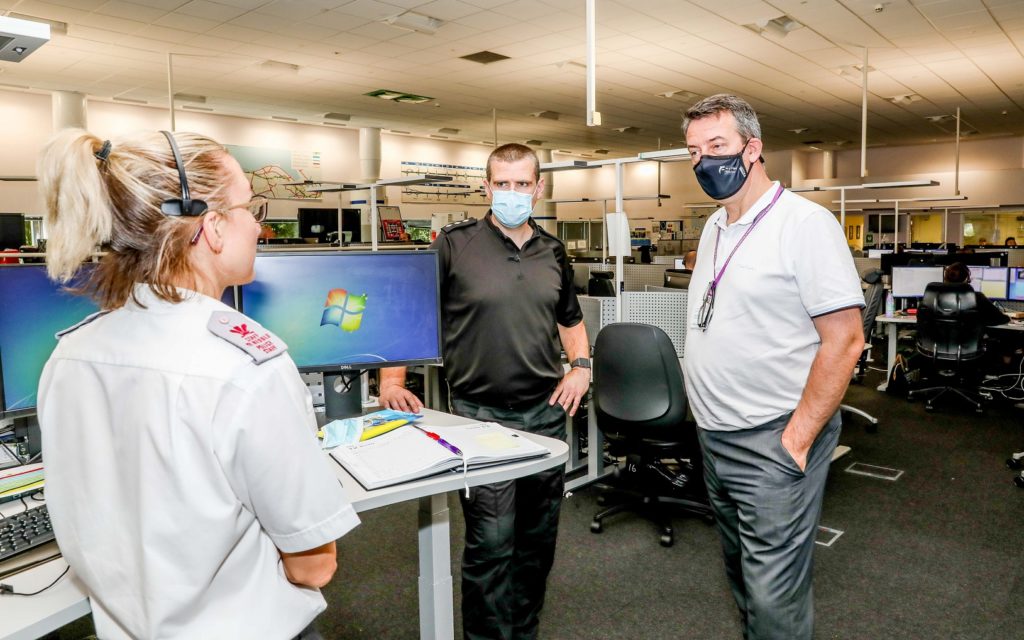
Police officers will be able to live stream incidents back to the control room when a new high-tech system is operational.
According to Paul Shea, the manager of North Wales Police’s control room, the sophisticated On Call software will save lives and reduce stress for staff liaising with officers on the ground.
He was speaking to the new North Wales Police and Crime Commissioner, Andy Dunbobbin, who has just signed a £5.8 million cheque to buy the new system that’s an upgrade of the force’s current command and control technology.
The control room in St Asaph already handles an average of 80,000 emergency 999 calls a year, on top of 250,000 non-emergency calls, 18,000 webchats and nearly 60,000 emails which all translates into an average of more than 1,100 contacts every day.
The new system which will be introduced in phases has been designed to dovetail with the new Emergency Services Network (ESN) that’s due to rolled out in the UK.
Mr Dunbobbin heard that other advantages of the control room’s cutting-edge new kit included the ability to pinpoint an exact location from a picture taken the scene.
It will also enable operators in the control room to deploy officers and other resources to deal with incidents at the click of a mouse.
Meanwhile, the ability to live stream from the scene of an event will be introduced as part of the second phase and will give incident managers a clearer picture of what’s going on and enable them to decide on the best way to respond.
Paul Shea said: “When the second phase kicks in we will be able to have live streaming of an event which the current system just couldn’t deal with, and the Force Incident Manager will be able to see it.
“At the same time will be able to share everything we have with the officers on the ground.
“If you’ve got a missing person you can attach a photograph to the event and send it and if you’re reporting an event and you don’t know where you are we can send you a text which you just reply to, and it tells us exactly where you are.
“If you take a photograph of where you are, it will use the data within the photograph to tell us where you are and place that in the event and place a spot on the map to tell us where you are.
“It’s ready for the new ESN which replaces the current Airwave system – we really are at the cutting edge of what computer aided dispatch looks like.
“It will save lives but it will also take the stress off our staff in the control room.”
It was music to the ears of the tech savvy commissioner who is also playing a leading role in fighting online crime across the UK and harnessing technology so forces can operate more effectively and efficiently.
He was recently elected by the Association of Police and Crime Commissioners as their deputy lead for police technology and digital and deputy lead for economic and cyber-crime, including fraud.
Mr Dunbobbin is also keen for technology to have an increasingly important part to play closer to home.
He said: “I’m really, really impressed with the operation in the control room and the level of expertise here.
“As somebody who comes from a technology, background I am committed to ensuring that North Wales Police has the best tools at its disposal.
“That’s why I am very pleased to be able to invest in the new computer aided dispatch system to complement the excellent work that is already happening in the control room.
“Although they may not be visible in a traditional way where we all like to see police on the streets, the staff in the control room work behind the scenes and it’s really good to see how it all knits together.
“This new system will make a massive difference and will help these heroes with headsets save even more lives.”
Chief Inspector Mark Williams, the Senior Force Incident Manager, said: “A lot of the time the control room is the front door into policing. Members of the public who need to contact the police invariably come through this room in one form or another.
“Our staff here have to deal with trauma on a regular basis, having to deal with victims of crime and people who are at their lowest ebb, so it’s a challenging role.
“We do really intensive training and they’re all very skilled at what they do, not just with systems but with communicating with people who are in a difficult situation.
“The new system will give officers complete access to everything we have in the control room in the palm of their hand when out on patrol so it will be a major leap forward in terms of technology.”